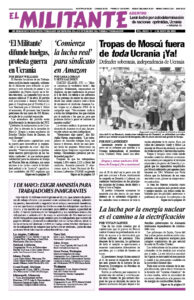Well-known author Heather Ann Thompson is suing the New York State Department of Corrections and Community Supervision for banning prisoners in the state from reading her award-winning book on the Attica prison rebellion, Blood in the Water: The Attica Prison Uprising of 1971 and Its Legacy.
“People have a right to read, and people have a right to history,” Thompson said in a press release. Authors “also have a right to have our books read. It’s a shame we live in a country where we censor people and ideas.” The New York Civil Liberties Union and the Civil Rights Clinic at the Benjamin N. Cardozo School of Law filed the federal lawsuit on her behalf.
The suit charges prison officials with violating the First and Fourteenth Amendments, which guarantee freedom of speech and prohibit depriving anyone of “life, liberty or property” without due process of law.
Blood in the Water tells the story of the rebellion, which began on Sept. 9, 1971, using previously suppressed government documents along with interviews with prisoners and guards who were at the prison then, and with their families.
The rebellion by 1,281 prisoners took place because of abusive prison conditions. In a statement that reverberated across the country and the world, prisoner Elliot “L.D.” Barkley proclaimed, speaking for his fellow prisoners, “We are men. We are not beasts and we do not intend to be beaten or driven as such.”
They presented authorities with a list of demands to guarantee their basic rights and their dignity as human beings.
On the order of Gov. Nelson Rockefeller, prison guards and state troopers responded by storming the prison yard in an orgy of terror, killing 43 people — 29 inmates and 10 prison employees who were being held hostage — and then tried to justify their assault by falsely claiming that prisoners had killed the hostages.
The lawsuit notes that inmates at other prison systems across the United States have access to the book. And in New York the Department of Corrections has permitted prisoners to received Soledad Brother: The Prison Letters of George Jackson, and other similar titles.
The Department of Corrections’ Central Office Media Review Committee claims the book violates its guidelines against materials that “advocate expressly or by clear implication acts of disobedience” towards “law enforcement or prison personnel.”
Thompson’s suit points out that there is no evidence that the book’s presence in prisons “has ever caused disruptions or safety concerns between officers and incarcerated persons.”
This is not the first time that New York prison authorities have violated the Bill of Rights and denied prisoners access to books or periodicals, including about the Attica rising.
In 2016 officials impounded several issues of the Militant going to a prisoner subscriber in Attica, starting with an issue featuring an article on the anniversary of the rebellion. Thompson was one of many prominent individuals and organizations who protested the ban and backed a challenge to it filed by the paper.
Prison officials never responded and the case became moot when the subscriber was transferred to another prison.
In 2017 an outcry forced New York authorities to rescind a test program that limited prisoners to ordering books from a sharply limited list of approved vendors with an extremely small selection. “They offer five junk sex novels, 14 bibles and religious books, 24 drawing/coloring books, 21 puzzle books, 11 guitar/chess/how-to books, one dictionary, one thesaurus,” writer and artist Molly Crabapple protested. “No other books can be sent.”
“We live in a world of increasing class conflicts, wars and resistance to oppression and injustice,” said Militant editor John Studer. “Working people inside prison walls have the same right to read about these developments, to think for themselves, read literature of their choosing and form their own opinions as those of us on this side of the walls.
“We join in calling on New York prison authorities to stop violating constitutional rights and allow prisoners to receive Blood in the Water.”

